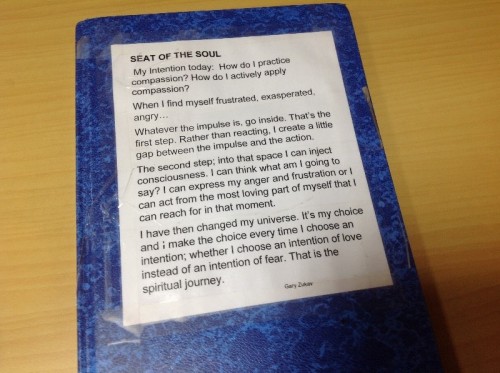A philosophical approach to a bad SFE
Shifa DesaiA few cycles ago, (yes, Foundation teachers measure time in teaching cycles), I got a bad student faculty evaluation. Now like a lot of stretched-to-capacity teachers, I am prone to think that my its-for-your-own-good style of teaching will win the day and students will realize that it comes from a place of I-need-to-get-you-to-the-next-level. As it turned out, not so much. Now this would be bad enough, but there is an auspicious irony to this. For weeks I had been keeping a reflective practice journal to record what works, what doesn’t and what requires rethinking. And then along came the united voice of a dozen or so students which seemed to say to me. “Reflect on this!”
Naturally this brought on a 12-hour period where no chocolates were safe around me, which then propelled me into a sugar-aggravated depression. My desire to lick every problem I face (yes, the chocolate-metaphor again) got me reaching into my archetypal index to solve it. By design, I default to mea culpa. Since I am the average of the five people I mostly associate with, we like-minded individuals look for answers to our life situations from the New York Times best sellers on our bookshelves.
While the industry word is stress management, I went another route and called it ‘applying compassion’. I read and adapted a chapter from Gary Zukav’s Seat of the Soul. This was my recipe: At the start of my workday I stated my intention: How do I practice compassion?
Walking to the class where I knew what challenges would confront me, I read this statement of intent: “When I find myself frustrated, exasperated angry…whatever the impulse is, go inside. That’s the first step. Rather than reacting, I create a little gap between the impulse and the action.”
The image accompanying this article is a picture of the note I pasted on the cover of my Reflective Practice book. It’s large, it’s clear, it gets to the point. I used this as a reminder every day. The act of first remaining still in the face of the challenges which undoubtedly came up, gave me the space I needed to choose how I was going to respond to the challenge. The effect of making the decision to act in a way that was helpful to me, and to mindfully and purposefully put it into practice every day, eased me into a calmer state of awareness.
After several years of teaching young people, I will never control their behavior, but I can control how I react to the challenges of the classroom. What I know about life and teaching English as a second language is, no matter how informed you are or how well you prepare, you could still fail. Ask any of the semi-finalists who didn’t win American Idol or The Great British Bake-off.
And for those of us who have spent most of our adult lives teaching, we slip into

adapted from Seat of the Soul
this trance of believing that by now, surely we need to be champions at what we do! We shouldn’t be messing up at this late stage in our careers. But where is it guaranteed that life and jobs get easier the longer you do it? When a situation comes along and slaps you on the wrist, or stabs you in the heart, you can feel down-hearted or degraded AND still look for the dignity that is yours, even if you feel like a sorry sack of shouldn’t have.
Reference
Zukav, G (1989) Seat of the Soul, Simon and Schuster, New York